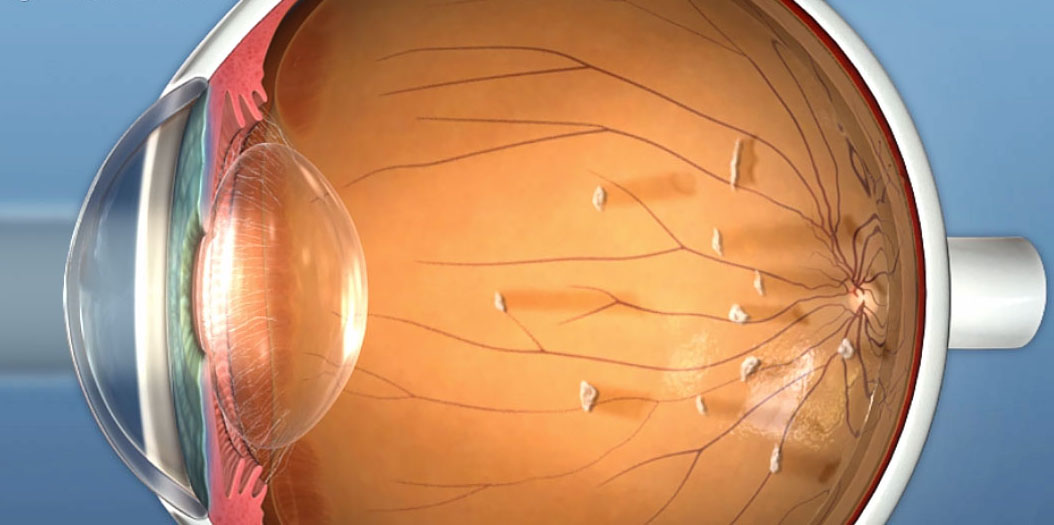Once the popped blood vessel in eye rupture under the transparent surface of your eye (conjunctiva), subconjunctival hemorrhage occurs. The mucous membrane cannot absorb a large amount of blood quickly, so blood cannot enter. You won’t even notice that you have subconjunctival bleeding until you look in the mirror and see that your white eyes turn bright red.
Subconjunctival bleeding usually does not cause noticeable damage to your eyes. Even severe sneezing or coughing can cause blood vessels to break in the eye. You don’t have to be forced to treat. Nevertheless, your symptoms may worry you. However, a subconjunctival hemorrhage is usually a harmless disease and will disappear within a short period.
Table of Contents
Symptom of the popped blood vessel in eye
The most apparent sign of subconjunctival bleeding may be bright red spots on the white (sclera) of the eye.
Although it looks bloody, subconjunctival bleeding should not cause vision changes, no discharge from the eyes, and no pain. Your discomfort alone may also be a rough sensation on the surface of your eyes.
When to see the doctor
If you have subconjunctival bleeding or other trauma all year round, please consult your doctor.
Risk factors of a popped blood vessel in the eye
Risk factors for subconjunctival hemorrhage include:
diabetes
High vital signs (hypertension)
Certain blood-thinning drugs, such as decoagulants (Coumadin, Jantoven) and Empirin
Coagulopathy
complication
There are few health complications in the unit of subconjunctival hemorrhage. However, if your condition is due to trauma, the doctor may measure your eyes to confirm that you will not cause other ocular complications or injuries.
Prevention of popped blood vessel in the eye
If the trauma in your eyes includes obvious specific causes, such as traumatic disease or blood-thinning medication, do everything possible to reduce the chance of subconjunctival bleeding and consult a doctor.
If you want to rub your eyes, please rub your eyes gently. Rubbing the eyes too hard can cause minor trauma to the eyes, leading to subconjunctival bleeding.
What is subconjunctival bleeding?
Subconjunctival bleeding may be a red spot in the eye caused by a ruptured blood vessel. It looks scary, but it is usually harmless.
The mucous membrane is the transparent membrane that covers the eye and contains many tiny blood vessels. Once the blood reaches this layer at a lower position, that is, under the conjunctiva. This blood does not involve the inside of the eyes or membranes, so it will not affect your vision.
Symptoms of subconjunctival bleeding
You may not even know that the ship is broken until you look into the highly mirrored place. ou will almost certainly not notice any symptoms, such as changes in vision, discharge, or pain. Instead, you will only have a rough sensation on the surface of your eyes.
The red spots may grow in 24 to 48 hours. Then, when your eyes absorb blood, it will slowly turn yellow.
If the blood does not flow out within two to three weeks, if you have further pain or vision problems, heavy bleeding under the conjunctiva, or any place in the colored area of the blood, call your doctor (iris).
Causes of a popped blood vessel in eye
These bleedings are usually caused by a sudden surge in vital signs due to the following reasons:
Strong innate reflex
tension
Strong cough
Vomiting
Some red spots are caused by personal injury or illness, such as:
Rub your eyes roughly
Injury is like sticking one thing in your eyes
Contact lens
Viral infection
surgery
Less common reasons include:
diabetes
High vital signs
Drugs that cause you to bleed, such as Empirin or blood thinners, such as decoagulants (Coumadin)
Coagulopathy
As you age, the chance of subconjunctival bleeding increases, especially at the age of fifty. This is because you may induce a variety of diseases, such as polygenic disorders and high vital signs.
Diagnosis of the popped blood vessel in eye
Your doctor will tell you that you have subconjunctival bleeding just by looking at your eyes. They will improve your overall health and injuries. They will use a tool called a slit lamp to jointly check your vital signs and appearance, and look closely at your eyes.
You may hope that the biopsy will produce a positive result, indicating that you do not have a severe traumatic illness.
Treatment of popped blood vessel in eye
Most erythema heals on its own without treatment. See how big it is. It will take days or weeks to walk away. No need to thank you for speeding up this method.
Self-care
Ice packs and over-the-counter tears will help relieve swelling and discomfort.
Medical service
Your doctor can treat any injury or condition that causes subconjunctival bleeding, such as medications for major vital signs.
Subconjunctival bleeding disorder
If you want to rub your eyes, please have sex gently. If you wear contact lenses, please clean and clean them frequently. Wear protective equipment when engaging in sports or sports that may cause eye injuries. Keep the traumatic disease under control.
Complications of subconjunctival hemorrhage
In most cases, there are no complications. This condition is rare, but complete bleeding under the conjunctiva may indicate that the elderly have severe vascular disease.
Prospects for subconjunctival hemorrhage
Subconjunctival bleeding can usually escape without causing any vision problems. However, in most cases, this happens again 100% of the time, or it usually occurs in people who take drugs such as blood thinners.
How to popped blood vessel in the eye
Over time, most of the time the ejected blood vessels will be cleared automatically. If your eyes are uncomfortable or painful, you can choose over-the-counter non-aspirin analgesics, which are usually right for you. Even if you feel your eyes are dry, you can use over-the-counter eye moisturizing drops.
If the burst blood vessel is caused by trauma or injury, your doctor may remove antibiotic drops or medications to reduce the chance of infection. However, even if the subconjunctival hemorrhage is caused by an infection, medication is also needed.
When to worry about a pair of eye injuries
In some cases, it may cause an injured eye or a ruptured blood vessel and cause the reason for the ophthalmologist to check. For example, if the trauma is caused by various injuries or bleeding, you must see a doctor.
Anterior chamber hemorrhage collects blood in the area between the membrane and iris, replacing that area with the same old fluid. The condition varies from severity to severity, but it can be severe and cause visual impairment. Blunt force trauma attracts attention, and some coagulation diseases, diabetes, improper treatment of blood-thinning drugs, and ocular tumors all cause bleeding.
If you take blood thinners (such as decoagulants) or have a traumatic illness, this is an honest plan to talk to your doctor. The irritation of the eye’s surface is probably not the cause of concern, but smart eye care is an essential part of maintaining your overall health, especially if you have a disease. Perennial subconjunctival bleeding is likely to be a sign of many serious medical deficiencies.
Bursting blood vessels in eye treatment
Seeing blood in the eyes is frightening, but it is usually not a cause for alarm.
During the initial eye injury, most of the blood from the subconjunctival bleeding will be reabsorbed into your body for a few days or once a week. Larger ruptured vessels will take longer to resolve.
If you are good at pain or discomfort, you can use unlisted non-blood cutting pain regional medicine units. Some doctors jointly recommend the wrong treatment of moisturizing eye drops or artificial tears. In some cases, it is necessary to use antibiotic drops or ointment per unit area.
Word for a popped blood vessel in eye
Even if the blood in the eyes looks heavy, it usually does not cause an alarm, especially if there is no pain or visual changes. Many of us suffer from subconjunctival hemorrhage in our doctor’s workplace and cannot recover the trauma, condition, or general medical defect. In some cases, during the entire sleep process, the blood vessel area unit ruptures due to a blow with one hand in the middle of the night. However, heavy subconjunctival bleeding twice a year may also cause concern, and you must undergo a comprehensive health check.
FAQ of the popped blood vessel in eye
1. When should I worry about how many ruptured blood vessels in my eyes?
Discharge, swelling, sharp changes in vision and sharp changes in painful areas all indicate that there may also be a deeper problem, and your specialist should evaluate it. In addition, if the damaged ship cannot be cleaned up within 14 days, it is an honest plan to inspect it.
2. How does one see the blood vessels popping out of the eyes?
Under all possible causes, there is only one cure for burst blood vessels-time! A subconjunctival hemorrhage is usually treated on its own because the mucous membrane slowly absorbs blood over time. Think that this has caused a dampening of attention. Expect a complete recovery within a period without long-term complications.
3. How long does it take for the burst blood vessels to heal?
Even severe sneezing or coughing can cause blood vessels to break in the eye. You don’t have to be forced to treat. Your symptoms may worry you. However, a subconjunctival hemorrhage is usually a harmless disease and will disappear within a short period.
4. Did will rupture blood vessels in the eye get worse?
Subconjunctival bleeding usually disappears within one to two weeks without treatment. However, keep in mind that it will intensify before it gets taller, and it will most likely turn yellow or pink before returning to tradition.
5. Will ruptured popped blood vessels in the eye get worse?
Subconjunctival bleeding usually disappears within one to two weeks without treatment. However, keep in mind that it will intensify before it gets taller, and it will most likely turn yellow or pink before returning to tradition.
6. Why did the popped blood vessel in the eye burst when I woke up?
The exact explanation of subconjunctival hemorrhage is not yet known. However, intense coughing, intense innate reflexes, work, or even intense happiness may increase sharp vital signs, and intense happiness may generate enough power to rupture the small blood vessels in the eyes.
7. Can my eyes come into contact with burst blood vessels?
However, although the blood in the blood vessel disappears under normal circumstances, the blood vessel itself still exists, which means that you will not be able to wear contact lenses. You will likely decide on the next leaky glasses so that you can adapt to restore contact lenses.
8. What will the pop-up boat look like?
Some people with aneurysms do not have any symptoms, but if the aneurysm ruptures and an internal injury occurs, it will undoubtedly cause pain, low vital signs, fast heartbeat, and dizziness. If an aneurysm occurs near the skin’s surface, it usually feels pain and swelling, accompanied by the mass movement.
9. Will’s eye drops promote the ejection of the popped blood vessel in eye?
No treatment is needed for subconjunctival hemorrhage. If artificial tears (eye drops) occur, it will help reduce eye irritation. Most ruptured blood vessels healed within two weeks. Larger attractions may take longer to walk away.
10. How does a person treat blowing veins?
Health care providers usually put a little pressure on injection sites to reduce blood loss and swelling. After a few minutes, they cleaned the world to prevent infection. If there is a lot of swelling, AN ice packs will help relieve symptoms. You will feel mild discomfort every day or two.
Is retinal hemorrhage an emergency?
In some cases, vitreous hemorrhage can develop rapidly without pain, which indicates a medical emergency. If you have symptoms of vitreous hemorrhages, such as sharp floats or spider webs or red or shadows in your vision, you should immediately contact an ophthalmologist or emergency room.
In the conclusion of the popped blood vessel in eye
If you suddenly notice blood in your eyes, try to stay calm. Due to subconjunctival bleeding, the visible blood in your eyes will be slowly absorbed by your body. Most cases resolved in about seven days without treatment1.
However, it may take 2 to 3 weeks for subconjunctival hemorrhage to disappear. Red may be orange, then pink, then white. After that, your eyes will not be stained by blood. Artificial tears can also be used to reduce any harshness.





